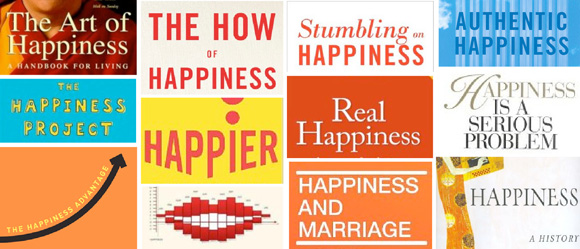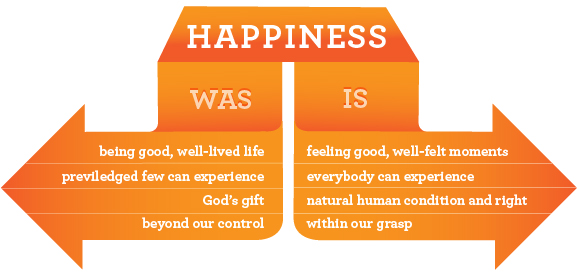 Happiness is "the new black" in American society. Today the American market is saturated with self-help books, therapeutic devices and services, and mood-enhancing drugs – all of which sell different variations on the theme of happiness. The search for happiness is also now a global concern as shown in the recent international success of the Rhonda Byrne's "The Secret", Gretchen Rubin's "The Happiness Project", and Dali Lama's "The Art of Happiness".
The impact of this new wave does not stop with an individual and with the market. It also influences psychological investigation, economical measure, political policy, and medical practice. Happiness, once considered an unscientific, soft subject matter, rose as a predominant topic especially in the field of Positive Psychology. Politicians and economists positively embrace the idea of using The Happiness Quotient such as GNH(Gross National Happiness) and HPI(Happiness Planet Index) as an alternative indicator to GDP (Gross Domestic Product) by measuring different domains of happiness including psychological well-being, health, and education.
Happiness is "the new black" in American society. Today the American market is saturated with self-help books, therapeutic devices and services, and mood-enhancing drugs – all of which sell different variations on the theme of happiness. The search for happiness is also now a global concern as shown in the recent international success of the Rhonda Byrne's "The Secret", Gretchen Rubin's "The Happiness Project", and Dali Lama's "The Art of Happiness".
The impact of this new wave does not stop with an individual and with the market. It also influences psychological investigation, economical measure, political policy, and medical practice. Happiness, once considered an unscientific, soft subject matter, rose as a predominant topic especially in the field of Positive Psychology. Politicians and economists positively embrace the idea of using The Happiness Quotient such as GNH(Gross National Happiness) and HPI(Happiness Planet Index) as an alternative indicator to GDP (Gross Domestic Product) by measuring different domains of happiness including psychological well-being, health, and education.In this world where tips to achieve happiness is literally a click away and measuring happiness is becoming common, happiness feels more tangible, accessible, and attainable than anytime ever.
WHAT IS HAPPINESS?
What is happiness? Before I dig deeper into this theme, this seemingly simple question turns out to be a lot more complicated than I thought. Is it a joyful emotional moment or more of an overall life satisfaction? Psychologist Paul Ekman says in his book, “Emotions Revealed,” that happiness is a placeholder for a constellation of positive emotional states, and introduces twelve different manifestations of happiness including joy, elation, wonder, contentment, and even schadenfreude, a German word meaning a pleasure derived from the misfortunes of others. This seems like a fair approach of answering the question, though the sum of manifestations is not exactly equal to the core entity that elicits them.
BIG SHIFT
While I research more into the different approaches of defining happiness, I find an interesting big shift in perspective that occurred around and during the Enlightenment period. Contemporary psychologists and other scientists define happiness as “positive emotional experiences” similar to Paul Eckman. However, ancient philosophers used to equate happiness with "virtue" or a "well-lived life". The emphasis was not on the "well felt moments" and positive feelings, but "virtuous actions” that are supposed to lead to happiness. As we all know, however, not all the people feel happy after practicing morally good behaviors. For example, there are people who find pleasure by hurting others. So while the definition of Ancient philosophers is not as flexible as the contemporary one, I can see from their attempt their "will to goodness" and yearnings to become a character who responds positively to the morally sound events in life. Sometimes I wonder how different our lives would be if we also held this view.

THE BURDEN OF HAPPINESS
Can celebrating happiness be anything but good? Is there any hidden cost or danger behind our seemingly harmless pursuit? Historian Darrin McMahon, the author of "Happiness" said the overemphasis on happiness might engender a new type of unhappiness and guilt caused by our failure to achieve happiness. Also the polarizing messages, which selectively salute and praise only positive emotional states, can distort our view of the unavoidable negative side of life and reduce our tolerance for it. Lastly, as the perspective of happiness shifted from a well-lived life to well-felt moments, and as researchers strive to objectively measure and assess happiness, the true depth and scope of happiness tends to be lost or forgotten. Based on this research, I selected happiness as the overall theme of my project and aimed to populate critical comments through design artifacts and narratives.
